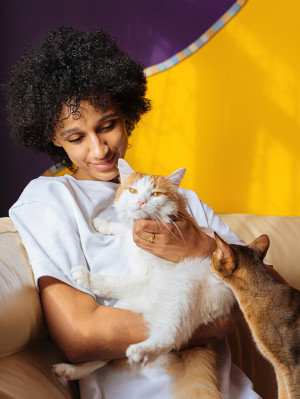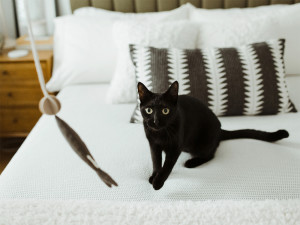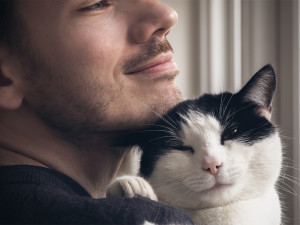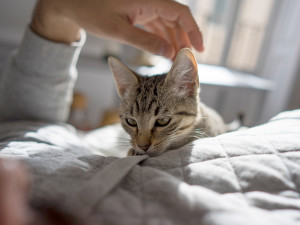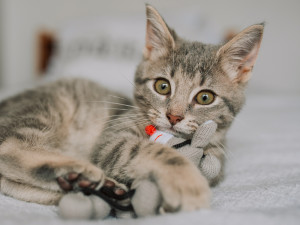Does Your Cat Hate Your New Partner?
How to help your kitty warm up to your S.O.
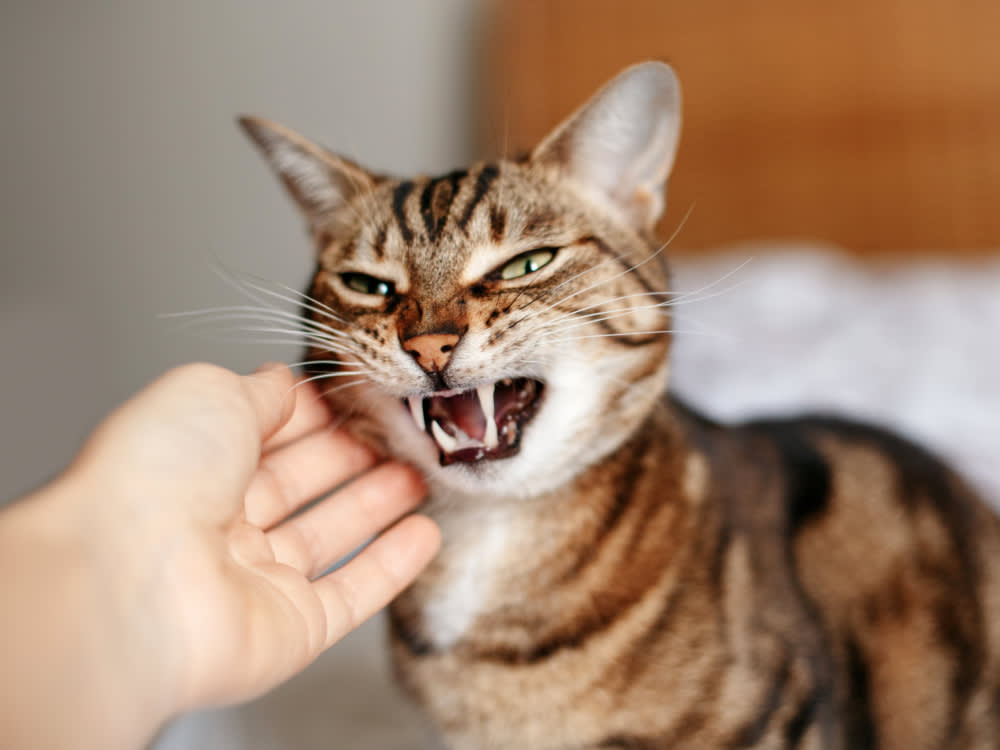
share article
It makes no sense. You’ve found the perfect person, your person, after so many years of duds...and your cat can’t stand them. At first it made you feel special, like your cat was jealous, or just liked you better, which of course they should. You’d have been hurt if they’d liked your new friend just as much as or, God forbid, better than you. But it’s been a while now, and despite your partner’s best efforts, your cat continues to hissopens in a new tab and take swipes at them simply for existing. You don’t know what to do. Why does your cat hate your partner?
“The most frequent reason is that your cat is not well socialized to people outside the home and is afraid of the new person,” says cat behavior consultant Jennifer Van de Kieftopens in a new tab. “Your partner may show up frequently and stay overnight, and the cat has not had time to adjust.”
Socialization is easiest during the first few months of a cat’s life, when everything is new to them, and they haven’t yet learned to fear humans and human things like vacuum cleaners and big, heavy boots. It’s not a fixed state, though, and a cat who was not well socialized as a kitten is still capable of change, depending on their personality. True, some cats just aren’t terribly social and you have to accept that, but cats, in general, are highly adaptable creatures and will usually adjust to changes in their environment over time.
This might sound counterintuitive, but try bringing more people into your home. Even if this doesn’t improve your cat’s overall socialization (though it should) it may take some of the pressure off your partner as the sole intruder into your cat’s space. And over time, your cat may begin to see not just you, but you and your partner both, as trusted presences in their life. (Of course, if your cat is being abused by your partner — perhaps being swatted or shooed at when you are out of the room — that would explain things and it is your responsibility to put your cat first and get this person away from them and yourself ASAP.)
But your partner is an absolute sweetheart, you say? In that case, it’s possible they simply remind your cat of someone they had bad experiences with in the past. “Many cats are rescued off the street and run into lots of different people, some who want to help them and others who may want to harm them,” Van de Kieft says. “One client’s cat was rescued from an abusive living situation and was fearful of anyone wearing a dark hoodie — even the owner.”
Fixing problems of this nature will require a bit of detective work on your part. Is your partner loud? Many cats hate loud or discordant noises. Do they make a mess or disrupt the general flow or vibe of the house in some way? Some cats have gender preferences. Does your cat hate all men or just men with beards? Maybe your partner could shave, at least until the cat learns to like him. He’s not a professional beard model, is he?
While you figure this out, there are other ways your partner can improve their relationship with your cat. They can play with themopens in a new tab or take over feeding or litter box dutiesopens in a new tab — cats tend to be closer with their caregivers. They can spritz their laps with catnip spray or offer the cat extra treatsopens in a new tab. “Letting cats come to you is a great way to let them feel in control,” Van de Kieft says. “When someone is trying too hard to follow a cat or touch them, it usually has the opposite of the desired effect and the cat wants nothing to do with them. I had another client whose husband was so intensely focused on their cats, that it freaked them out and they were actually more fearful of him. If the cat is fearful, be aware of how you’re coming across with body language. Approach sideways to minimize your size, and don’t make direct eye contact — which cats may view as a threat.”
“Slow blinkingopens in a new tab is also worth trying,” Van de Kieft adds. A slow blink is a cat’s way of telling a person that they are relaxed and trust them, so if your partner lets your cat know that they are relaxed and trust them, your cat may come to feel the same way. Of course, even after all this, your cat may never like your partner as much as they like you — but let’s be honest, you really do prefer it that way.

Charles Manning
Charles Manning is an actor, writer, and fashion/media consultant living in New York City with his two cats, Pumpkin and Bear. Follow him on Instagram @charlesemanningopens in a new tab.
Related articles
![Black cat staring at a cat toy]() opens in a new tab
opens in a new tabHow to Play With Your Cat
Cat behaviorist Cristin Tamburo’s got a game plan.
![cat snuggling man]() opens in a new tab
opens in a new tabWhat’s Your Cat’s Love Language?
Five surprising ways cats show affection (and how you can show it back), according to a cat behaviorist.
![kitten sleeping on top of person]() opens in a new tab
opens in a new tabWhy Does My Cat Sleep on Me?
Not into cuddling? Too bad — they’re spending the night.
![Small gray tabby kitten playing with a toy]() opens in a new tab
opens in a new tabThe Best Catnip Toys and Treats That’ll Have Your Cat Riding High
Let the purring, drooling, and chasing invisible butterflies commence.
- opens in a new tab
Dream of High-Fiving Your Cat? Here’s How to Teach a Cat Tricks
It takes some patience (shocker), but it can be done.
![cat playing fetch]() opens in a new tab
opens in a new tabHow to Train a Cat
Move over, pups. This is a cat’s game, too.


